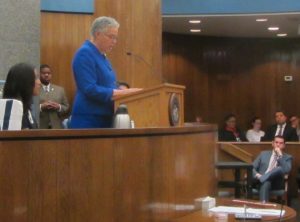Temporary soda tax reprieve in Cook County
By Jean Lotus Staff Reporter — July 3, 2017
Cook County Board President Toni Preckwinkle speaks to the board after proposing the soda tax in October. (Chronicle Media)
A judge, at the last minute, blocked Cook County’s sweetened beverage tax with a temporary restraining order the day before the penny-an-ounce charge was to go into effect July 1.
Attorneys for the Illinois Retail Merchants Association filed a lawsuit June 27 asking for a delay in implementing the county’s tax until the court had ruled on whether the tax on sweetened drinks was uniformly assessed and collected according to the Illinois commercial code.
Circuit Court Judge Daniel J. Kubasiak heard arguments from the IRMA lawyers that a temporary restraining order was necessary because it would be impossible to refund taxes collected by the county if the tax was repealed. County lawyers suggested customers could bring their receipts to grocery stores for a tax refund.
The estimated new tax on a 2-litre bottle of sweetened beverage would be 68 cents. Tax on a six-pack would add 72 cents to the price.
Lawyers from IRMA said in the lawsuit that the tax was not “uniformly” assessed for all sweetened beverages. For example a barista-poured Starbucks latte drink would not be charged the tax, whereas a prepackaged drink would.
The Cook County Board passed the soda tax in November 2016, by a razor-thin margin. Board President Toni Preckwinkle broke the board’s tie. The county and Preckwinkle hoped the new taxes would generate $200 million in revenue to help plug a $174 million hole in the Cook County budget for personnel and pension costs.
Immediately after the proposed tax passed, beverage and restaurant groups protested. The American Beverage Association quickly launched a No Cook County Beverage Tax website and produced anti-soda tax radio ads.
Preckwinkle said the county budget was depending on the soda-pop tax.
“While we respect Judge Kubasiak’s decision, we are disappointed that he has granted a temporary restraining order (TRO) preventing the collection of the sweetened beverage tax,” a statement from Preckwinkle’s office said. “Revenue from the tax is critical to both balancing our FY2017 budget and development of our FY2018 budget. As a result of the injunction and its timing, I have asked my Finance Department to look at all options to compensate for the revenue that would have been generated by the tax.” Preckwinkle’s office threatened to appeal the ruling.
Taxes on sugary drinks are correlated with reduced consumption of soda pop and other sweetened beverages, and that may help stop obesity, according to a 2016 article in the American Journal of Public Health. The nation’s first soda tax in Berkeley, Calif. in 2014 led to a pop-drop of 21 percent fewer sugary beverages consumed, the study said. Health policy philanthropies run by former New York mayor billionaire Michael Bloomberg have taken on obesity as a public health challenge. Bloomberg supported the Berkeley tax and donated $18 million last year to a similar effort in Philadelphia. Bloomberg even spent $1 million on advertising for Preckwinkle’s soda tax initiative.
Bloomberg’s charities have waged lawsuits against “Big Soda” companies such as Coca Cola. In 2013, while he was still mayor of New York, Bloomberg’s team lost a lawsuit against a city ban on “Big Gulp” and “Supersized” fountain drinks in servings more than 16 ounces. An appellate judge ruled Mayor Bloomberg overreached his authority to outlaw drinking the extra-large soda, which, the judge said, constituted free speech.
It was unclear whether the County’s legal team had asked or would ask Bloomberg for financial or legal help with the new suit.



